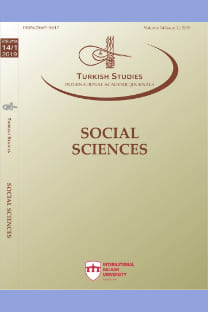Küresel Kamusal Bir Mal Olarak ABD Hegemonyası
The Us Hegemony as a Global Public Good
___
- Anand, P.B. (2004), “Financing the Provision of Global Public Goods”, World Economy, Vol. 27, No. 2, 215-37. DOI: https://onlinelibrary.wiley.com/ doi/abs/10.1111/j.14679701.2004. 00597.x
- Babones, S. (2015), “The Once and Future Hegemon”, The National Interest, No. 138, 54-62.
- Buchanan, J. M. (1968), “The Demand and Supply of Public Goods”, https://www.econlib.org/library/Buchanan/buchCv5.html (Erişim Tarihi: 12.09.2019).
- Duncombe, C. ve T. Dunne, (2018), “After Liberal World Order”, International Affairs 94: 1, 25– 42; DOI: https://doi.org/10.1093/ia/iix234
- Ellickson, B. (1973), “A Generalization of the Pure Theory of Public Goods”, The American Economic Review, Vol. 63, No. 3 (Jun., 1973), 417-432.
- Harris, J. (2003), “Transnational Competition and the End of U.S. Economic Hegemony”, Science & Society, Vol. 67, No. 1, 68-80.
- Ignatius, D. (2016), ‘What President Trump’s Foreign Policy Will Look Like’, Washington Post, 9 Nov., https://www.washingtonpost.com/opinions/global-opinions/what-president-trumpsforeign-policy-will-looklike/2016/11/09/3ab88670-a63211e6ba59a7d93165c6d4_story. html?utm_term=.b8cf2a46b2fb. (Erişim Tarihi: 16.10.2019).
- Ikenberry, G.J. (1989), “Rethinking the Origins of American Hegemony”, Political Science Quarterly, Vol. 104, No. 3, 375-400.
- Ikenberry, G.J. (1996), “The Future of International Leadership”, Political Science Quarterly, Vol. 111, 385-402.
- Ikenberry, G.J. (2011), Liberal Leviathan, The Origins, Crisis, and Transformation of the American World Order, Princeton University Press.
- Ikenberry, G.J. (2018), “The End of Liberal International Order?”, International Affairs, 94: 1 (2018) 7–23. DOI: https://doi.org/10.1093/ia/iix241
- Jinpin, X. (2017), Davos World Economic Forum, Jinping, Xi. https://www.weforum. org/agenda/2017/01/full-text-of-xi-jinping-keynote-at-the-worldeconomic-forum. (Erişim Tarihi 12.11.2019).
- Kaul, I., Grunberg, I. ve Stern, M.A. (1999), Global Public Goods: International Cooperation in the 21st Century, Oxford University Press, Oxford.
- Layne, C. (2018), “The US–Chinese power shift and the end of the Pax Americana”, International Affairs 94: 1, 89–111. DOI: https://doi.org/10.1093/ia/iix249
- Lin, S. (2016), “The Public Costs of Grand Strategy in The Trump Era”, World Affairs , Vol. 179, No. 3, 4-23. DOI: https://doi.org/10.1177/0043820016689516
- Min, B.W. (2003), “Understanding International Hegemony: A Complex Systems Approach”, Journal of International and Area Studies, Vol. 10, No. 1 (June 2003), 21-40.
- Moody, A. (2018), “Shanghai Spirit”, China Daily: European Weekly https://search.proquest.com/docview/2055302586/4637D194A1D24794PQ/1?accountid=1 6 645 (Erişim Tarihi: 13.03.2019).
- Norrlof, K. (2018), “Hegemony and Inequality: Trump and The LiberalPlaybook”, International Affairs 94: 1 (2018) 63–88. DOI: https://doi.org/10.1093/ia/iix262
- Nye, J.S. (2002), “The American National Interest and Global Public Goods”, International Affairs, Vol. 78, No.2 , 233-244.
- Nye, J. (2019), “The Rise and Fall of American Hegemony from Wilson to Trump”, International Affairs 95: 1, 63–80. DOI: https://doi.org/10.1093/ia/iiy212
- Posen, B. (2018), “The Rise of Illiberal Hegemony: Trump’s Surprising Grand Strategy,” Foreign Affairs, 97(2): 20-27.
- Regilme, S. ve Parisot J. (2017), “Debating American Hegemony: Global Cooperation and Conflict”, American Hegemony and the Rise of Emerging Powers: Cooperation or Conflict, Edited By S. Regilme ve J. Parisot, Routledge Press., 1-17.
- Rucki, S. M.(2011), “Global Economic Crisis and China’s Challenge to Global Hegemony: A NeoGramscian Approach”, New Political Science, Volume 33, Number 3, September, 335-355. DOI: https://doi.org/10.1080/07393148.2011.592022
- Samuelson, P. (1954), “The Pure Theory of Public Expenditure”, The Review of Economics and Satistics, Vol. 36, No.4, 387-389.
- Sarıöz Gökten, Y. (2013), Hegemonya İlişkilerinin Dünü, Bugünü ve Geleceği: Neo-Gramsci'ci Bir Bakış, Notabene Yayınları, Ankara.
- Saull, R. (2012), “Rethinking Hegemony: Uneven Development, Historical Blocs, and the World Economic Crisis”, International Studies Quarterly, Vol. 56, No. 2, 323-338. DOI: http://doi.org/10.1111/j.l468-2478.2012.00720.x.
- Schmidt, I. (2008), “Krizleri Kıyaslamak 1930’lar, 1970’ler ve Bugün”, Editör William Tabb ve Diğerleri, İçinde Neoliberalizm ve Kriz, Çeviren Barış Baysal ve Diğerleri, Kalkedon Yayınları, 65-77.
- Smith, A. (2018), “Illiberal Hegemony: The Trump Administration Strategy for US Imperialism”, International Socialist Review, Issue 109, https://isreview.org/issue/109/illiberalhegemony-trump-administration-strategy-us-imperialism (Erişim Tarihi: 08.03.2019).
- Stephens, P. (2016), America Can Survive Trump. Not So The West, Financial Times, 10 Nov., https://www.ft.com/content/73313d4c-a68e-11e6-8898-79a99e2a4de6 (Erişim Tarihi: 18.09.2019).
- Stiglitz, J.E. (2017), “The Age of Trump, Project Syndicate”, project-syndicate.org/onpoint/theage-of-trump-by-joseph-e-stiglitz-2017-01?barrier=accesspaylog (Erişim Tarihi: 12.10.2019).
- Stokes, D (2018), “Trump, American Hegemony And The Future Of The Liberal International Order”, International Affairs 94: 1, 133–150. DOI: http://doi.org/10.1093/ia/iix238
- Sullivan, J. (2018), “The World After Trump: How The System Can Endure”, Foreign Affairs, Vol. 97, Iss. 2, 10-19. DOI: https://doi.org/10.18778/1641-4233.23.02.
- Trump, D. (1987) “I don’t Want to be President”: Entire 1987 CNN Interview’, in Larry King Live, CNN, 2 September, 1987.
- Trump, D. (2017a), Inaugural address, https://www.whitehouse.gov/briefings-statements/theinaugural-address/ (Erişim Tarihi: 13.03.19).
- Trump, D. (2017b) Remarks by President Trump at APEC CEO Summit, Da Nang, Vietnam, https://www.whitehouse.gov/briefings-statements/remarks-president-trump-apec-ceosummit-da-nang-vietnam/
- Wolf, M. (2017), “The Long and Painful Journey to World Disorder”, Financial Times, 5 Jan. https://www.ft.com/content/ef13e61a-ccec-11e6-b8ce-b9c03770f8b1 (Erişim Tarihi: 23.09.2019).
- ISSN: 2667-5617
- Yayın Aralığı: 6
- Başlangıç: 2006
- Yayıncı: ASOS Eğitim Bilişim Danışmanlık Otomasyon Yayıncılık Reklam Sanayi ve Ticaret LTD ŞTİ
Kayda Geçen Suçluluk ve Türkiye
Küresel Kamusal Bir Mal Olarak ABD Hegemonyası
Trafficking in Women: Global Trends and Turkey
Popüler Kültür, Adli Bilimler ve Dizi Filmler Bağlamında Yeni Bir Kavram: Kurgusal Atıf
Çalışanların Bakış Açısından Kurumsal Sosyal Sorumluluk
Ebru Beyza BAYARÇELİK, Hande Begüm BUMİN DOYDUK
Corporte Social Responsibility from Employees’ Perspective
Hande Begüm Bumin DOYDUK, Ebru BAYARÇELİK
